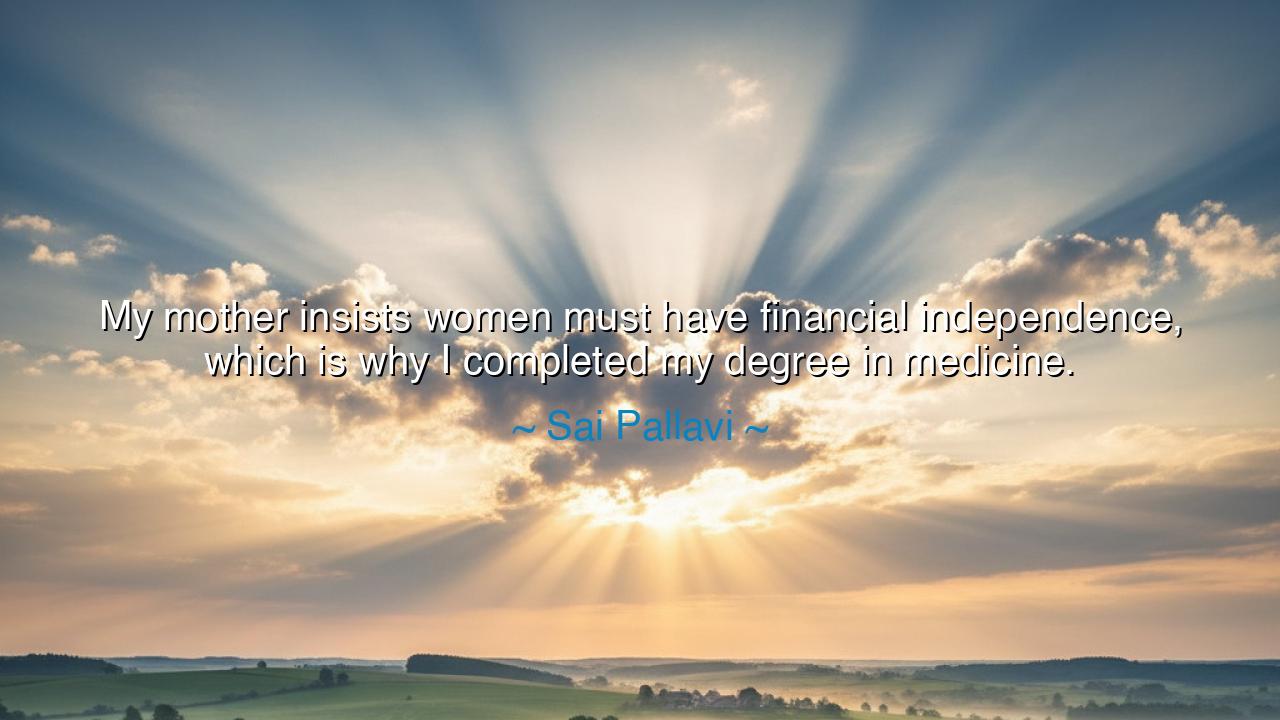
My mother insists women must have financial independence, which
My mother insists women must have financial independence, which is why I completed my degree in medicine.






The words of Sai Pallavi, when she said, “My mother insists women must have financial independence, which is why I completed my degree in medicine,” are not merely the recollection of personal guidance, but a declaration rooted in the timeless wisdom of generations. These words, though spoken softly, carry the strength of a mother’s foresight and the dignity of a daughter’s obedience to truth. They reveal that financial independence is not only about the possession of wealth, but about the possession of power — the power to live with freedom, to choose one’s path, and to stand unbent before the storms of circumstance.
In her mother’s insistence lies the voice of countless women who came before, those who knew too well the pain of dependence. They were women whose dreams were bound by the chains of expectation, whose talents withered in the shadow of others’ decisions. But from their silence rose a generation that would no longer bow. The mother in Sai Pallavi’s words speaks not only for her daughter, but for all women — declaring that to be free in spirit, one must also be free in livelihood. For what is liberty if it cannot feed the body, sustain the heart, and guard one’s dignity? Thus, financial independence becomes not a luxury, but a shield — one forged through education, discipline, and self-reliance.
Consider the story of Florence Nightingale, the Lady with the Lamp. In an age when women were confined to drawing rooms and denied the right to serve their calling, she chose a path of service and study. Her family resisted her desire to pursue medicine and nursing, fearing it would bring shame to their name. Yet she persisted, guided by her inner conviction and her knowledge that her purpose required her independence. Through her learning and labor, she redefined the meaning of care, turning a humble profession into a sacred science. Like Sai Pallavi, she understood that education is the foundation upon which a woman’s freedom stands — a temple where knowledge becomes both weapon and prayer.
In saying she completed her degree in medicine, Sai Pallavi honors that ancient lineage of women who fought not for power over others, but for mastery over themselves. Medicine, the art of healing, becomes a symbol here — of intellect, of service, of inner strength. It represents not only a career, but a vow: that a woman must never be at the mercy of the world’s pity or control. The mother’s insistence is thus a blessing disguised as discipline, the voice that says, “Build your own wings, for no one else can carry you forever.” It is a teaching of love that demands effort — a mother’s wisdom that knows true security is not in comfort, but in capability.
The beauty of these words lies also in their humility. They do not boast of rebellion, but of responsibility. Independence, in this light, is not arrogance, but gratitude — gratitude toward one’s parents, teachers, and self for the opportunities that enable growth. The daughter fulfills the mother’s dream not through defiance, but through fulfillment. This harmony between generations — between tradition and progress — is what gives the saying its power. It reminds us that independence need not sever the bonds of family; it can strengthen them, turning love into partnership, and respect into equality.
Yet, we must remember: the mother’s wisdom does not belong to women alone. It belongs to all who seek to live with dignity and purpose. The lesson of financial independence is universal — that one must earn the means to stand upright, to protect one’s integrity, and to serve others without fear. Dependence, even when gilded with comfort, weakens the spirit. Independence, though it demands sacrifice, builds character. To work, to learn, to create — these are acts of honor, not merely survival.
So, O listener, take this teaching into your heart. Whether you are a woman or man, a student or a master, remember that the truest form of love is that which empowers another to be free. Teach your daughters not only kindness, but competence; teach your sons not only ambition, but respect for the strength of women who walk beside them as equals. Let every home echo the mother’s timeless decree: that independence is the first step toward dignity, and dignity the first step toward peace.
Thus, the wisdom of Sai Pallavi’s words becomes eternal: to live freely, one must stand upon one’s own work. Wealth fades, beauty changes, and fame passes like wind, but the ability to sustain oneself — through knowledge, effort, and courage — endures. Let each of us, then, complete our own “degree” in life’s chosen field, not only to earn, but to become — to become beings who need nothing but truth to sustain them, and who use their strength to light the way for others. For in such independence lies not just freedom, but the very essence of the human soul.






AAdministratorAdministrator
Welcome, honored guests. Please leave a comment, we will respond soon